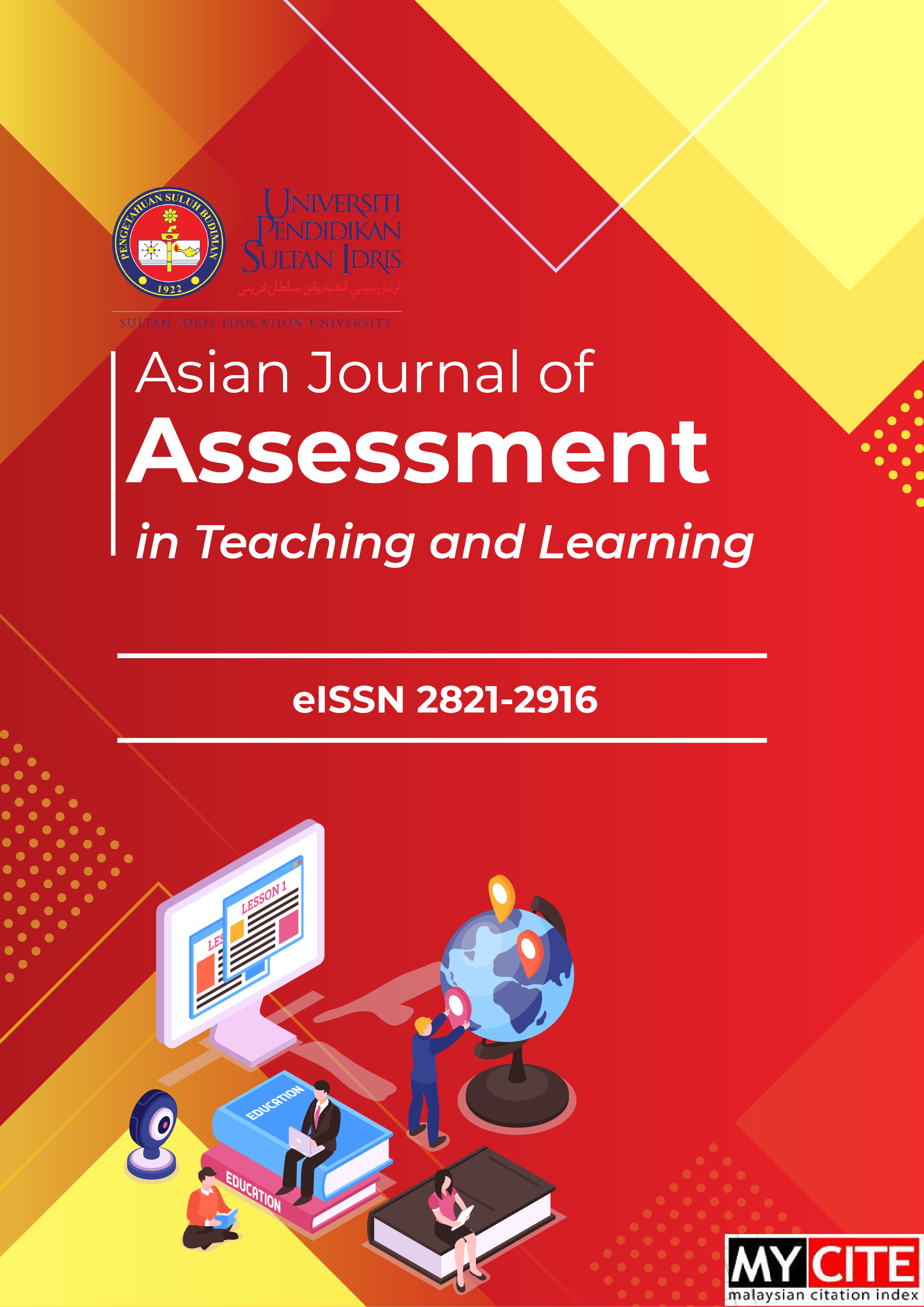A case study of direct assessment of students’ manipulative skills in chemistry practical: Perspective of lecturers
DOI:
https://doi.org/10.37134/ajatel.vol10.2.2.2020Keywords:
Chemistry, Direct Assessment, Manipulative Skills, Matriculation, PracticalAbstract
Direct assessment has adopted in matriculation college as an innovative change in assessment method for practical in line with the implementation of outcome-based education. The purpose of this study was to obtain the views of matriculation lecturers on the use of direct assessment to assess students’ manipulative skills in titration experiment during Chemistry practical. A qualitative case study approach was adopted, in which four matriculation lecturers were purposely selected. Observation and interview were conducted to obtain their views regarding to the perception, implementation, effectiveness, and critical factors for sustainability of direct assessment. The findings of the study indicated that lecturers positively perceived direct assessment were able to enhance students’ manipulative skills in Chemistry practical, by identifying their weaknesses in skills and to increases their motivation in hands-on practical. Several issues such as lack of skills among lecturers and the requiring of excessive effort needed to overcome in order to sustain the implementation of direct assessment in matriculation college.
Downloads
References
Abrahams, I. & Reiss, M. J. (2015). The assessment of practical skills. School Science Review, 96(357), 40-44.
Abrahams, I., Reiss, M. J., & Sharpe, R. M. (2013). The assessment of practical work in school science. Studies in Science Education, 49(2), 209-251.
doi:10.1080 /03057267.2013.858496
Baharom, S., Khoiry, M. A., Hamid, R., Mutalib, A. A., & Hamzah, N. (2015). Assessment of psychomotor domain in a problem-based concrete laboratory. Journal of Engineering Science and Technology, 1-10.
Chen, H.-J., She, J.-L., Chou, C.-C., Tsai, Y.-M., & Chiu, M.-H. (2013). Development and application of a scoring rubric for evaluating students’ experimental skills in organic chemistry: An instructional guide for teaching assistants. Journal of Chemical Education, 90(10), 1296-1302.
doi: 10.1021/ed101111g
Creswell, J. W. (2013). Qualitative inquiry and research design: Choosing among five approaches (3rd ed.). Thousand Oaks, CA: SAGE Publications.
Curriculum Development Division (2018). Kurikulum standard sekolah menengah: Dokumen standard kurikulum dan pentaksiran kimia tingkatan 4 dan 5. Putrajaya: Ministry of Education Malaysia.
Fadzil, H. M., & Saat, R. M. (2013). Phenomenographic study of students’ manipulative skills during transition from primary to secondary school. Jurnal Teknologi, 63(2), 71-75.
Fadzil, H. M., & Saat, R. M. (2017). Exploring students’ acquisition of manipulative skills during science practical work. EURASIA Journal of Mathematics Science and Technology Education, 13(8), 4591-4607.
doi: 10.12973/eurasia.2017.00953a
Fadzil, H. M., & Saat, R. M. (2019). Development of instrument in assessing students’ science manipulative skills. Malaysian Online Journal of Educational Studies, 7(1), 47-57.
Ferris, T. L, & Aziz, S. M. (2005). A psychomotor skills extension to Bloom’s taxonomy of education objectives for engineering education. Paper presented at International Conference on Engineering Education and Research: Exploring Innovation in Education and Research, Tainan, Taiwan.
Hunt, L., Koenders, A., & Gynnild, V. (2011). Assessing practical laboratory skills in undergraduate molecular biology courses. Assessment & Evaluation in Higher Education, 37(7), 861-874
Lian, L. H., & Yew, W. T. (2013). A framework of teachers’ concern about school based assessment of science practical work (PEKA). Jurnal Sains dan Matematik, 5(1), 1-7.
Macayan, J. V. (2017). Implementing outcome-based education (OBE) framework: Implications for assessment of students’ performance. Educational Measurement and Evaluation Review, 8(1), 1-10.
Malana, J. C. (2016). Manipulative skills of students in general chemistry. Imperial Journal of Interdisciplinary Research, 2(7), 1030-1034.
Matriculation Division (2019). Chemistry laboratory manual semester I & II SK015 & SK025 (1st ed.). Putrajaya: Ministry of Education Malaysia.
McFarlane, D. A. (2013). Understanding the challenges of science education in the 21st century: New opportunities for scientific literacy. International Letters of Social and Humanistic Sciences, 4, 35-44.
Merriam, S. B., & Tisdell, E. J. (2016). Qualitative research: A guide to design and implementation (4th ed.). San Francisco, CA: Jossey-Bass.
Oloruntegbe, K. O. (2010). Approaches to The assessment of science process skills: A reconceptualist view and option. Journal of College Teaching & Learning, 7(6), 11-18.
Richie, J., & Spencer, L. (1994). Qualitative data analysis for applied policy research. In A. Bryman & R. G. Burgess (Eds.), Analysing qualitative data (pp. 173-194). London: Routledge.
Sedumedi, T. D. T. (2017). Practical work activities as a method of assessing learning in chemistry teaching. EURASIA Journal of Mathematics Science and Technology Education, 13(6), 1765-1784.
Towns, M., Harwood M. J., Robertshaw, M. B., Fish, J., & O’Shea, K. (2015). The digital pipetting badge: A method to improve student hands-on laboratory skills. Journal of Chemical Education, 92(12), 2038-2044.
doi: 10.1021/acs.jchemed.5b00464
Wright, J. S., Read, D., Hughes, O., & Hyde, J. (2018). Tracking and assessing practical chemistry skills development: Practical skills portfolios. New Directions in the Teaching of Physical Science.





